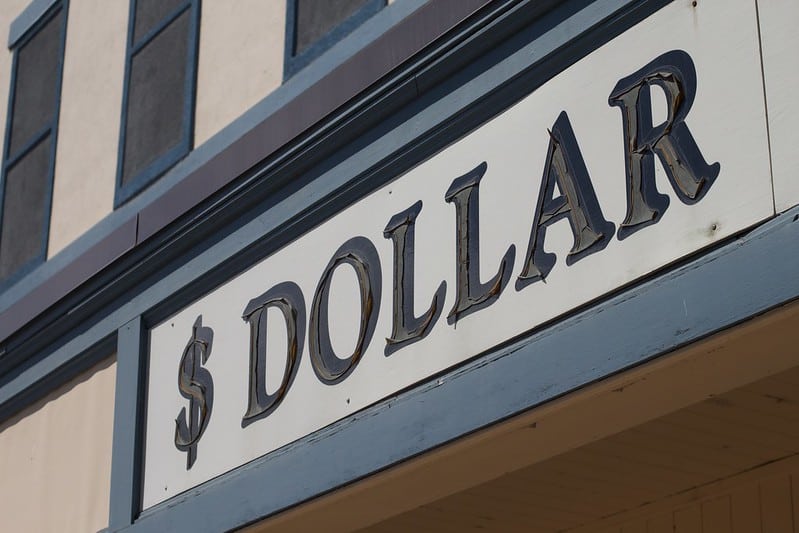
The major dollar store chains have made a point of providing more fresh and healthy foods to allow customers to do more of their grocery shopping there. But a new report finds that the proliferation of dollar stores is bad for independent grocers – and, therefore, bad for grocery shoppers as well.
The authors of “Dollar Store Expansion and Independent Grocery Retailer Contraction,” newly published by the academic journal Applied Economic Perspectives & Policy, argue that the growth of dollar stores “significantly and negatively impacts sales and employment of independent grocery stores and significantly increases the likelihood that these stores go out of business.”
In other words, shoppers who choose to buy groceries at a dollar store, may soon find they have no choice but to do so.
“Dollar stores present a competitive threat to independent grocery retailers because of their lower costs and prices,” the report reads. Dollar stores have small facilities that are less expensive to operate, with a limited selection and require fewer employees than full-service grocery stores. Large chain grocers and big-box stores have the economies of scale to be able to compete, the researchers state, but it’s the independent grocers that are at risk of getting forced out.
Their research found that the entry of dollar stores into a community “is associated with a 5.7% decrease in sales, a 3.7% reduction in employment and a 2.3% rise in the likelihood of independent grocery retailers quitting the business.” That phenomenon is even more pronounced in rural communities, where “the exit probability of independent grocery retailers is almost three times larger” than in urban communities.
While “dollar stores have become the fastest-growing food retailer regarding household expenditure share, particularly in rural and low-income areas,” the report cautions, “independent grocery retailers provide essential services to largely remote communities and offer access to healthy food and other community services.” If those independent grocers can’t survive, shoppers in a community may have few options other than dollar stores. And while the major dollar store chains have expanded their food selection, even Dollar General points out that it is “not a grocer.” So shoppers may find themselves having to buy groceries at a store that’s not actually a grocery store, which could limit their options and their access to healthy foods.
This report is just the latest to sound the alarm about the pressures facing independent grocery retailers, as they get squeezed from both sides by large big-box chains, and dollar stores. A couple of years ago, the National Grocers Association, a trade group representing the independent supermarket industry, called on Congress to “investigate the unchecked power of big box stores and e-commerce giants,” which they say use their scale and influence to “disadvantage independent grocery stores and the communities they serve.”
The nonprofit advocacy group The Institute for Local Self-Reliance has called out big-box stores’ dominance as well. But it has also sounded the alarm about dollar stores, accusing them in a 2018 report of “taking a toll on grocery stores and, in many cases, reducing people’s access to fresh food.” The group encouraged communities to support independent grocers over dollar stores, which it called “a poor substitute for grocery stores.”
This most recent report, then, is just the latest to say that even dollar stores’ expanded grocery selections aren’t expansive enough. “Across the U.S., there is anxiety among communities and advocates as the rapid spread of dollar stores leads to the closure of local businesses and brings with them unhealthy food choices,” the new report notes. This, the researchers say, is “a particular problem in low-income areas with little or no alternative food outlets.”
So you may be drawn to your local dollar store for its low prices and convenience. But those benefits could ultimately come at a long-term cost, as a growing number of researchers says that
what’s good for your wallet may not be good for your community, your local economy – or your health.
Image source: Alan Levine










